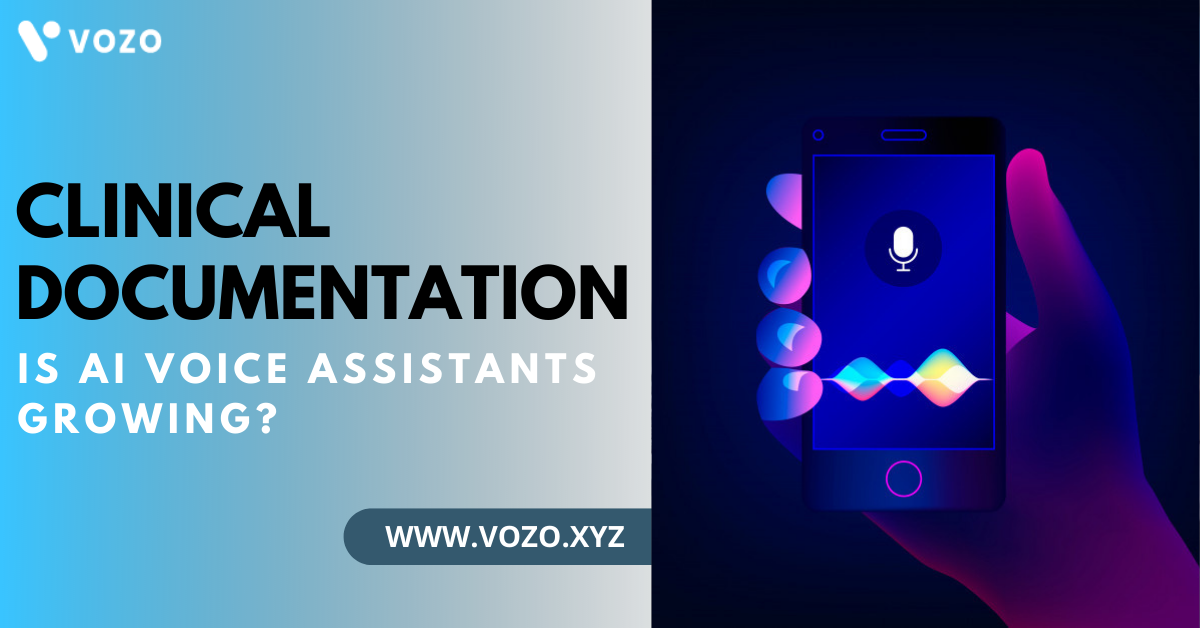Clinical Documentation: Is AI Voice Assistants Growing?
Every healthcare organization is different and their needs are unique. Even though many of the medical practices are started adapting to the newest technologies, the clinical documentation process still creates an EHR burden. Can AI voice assistants be used to allow healthcare providers to spend less time on administrative tasks and more time on delivering value-based care to their patients? In this article, we explain how AI voice assistants are rising in the process of clinical documentation and to ease the EHR burden.
The Role Of AI In Clinical Documentation
Today, physicians can spend approximately one-third of their time checking medical records, patient entries, creating notes with the help of EHR documentation. Some of their activities may include providing continuity of care and ensuring billing documentation. This takes much of their valuable time and cost. As the payment models become more complex day by day, healthcare providers are started looking for the best ways to improve clinical documentation. Here come the ultra benefits of AI which reduces the EHR burden.
Patient-Physician Encounter: How It Should Be Handled?
The most important benefit of AI is in the process of patient-physician encounters during the data reviews conducted for research and quality improvement. To achieve this, some of the EHR vendors are started using a natural language processing (NLP) engine to automate medical chart reviews. How this can be possible? The process is carried out by evaluating EHR data and identifying exact ways to improve EHR documentation for in-patient encounters in near real-time.
This may be a great idea to get started with. But what may be the first step to advanced clinical documentation in the patient-physician encounter — data entry? The best solution is to make use of the software with advanced documentation features. This software will take all the structured data from the patient-physician encounter and then automatically enters it into the EHR field.
READ MORE: Why It’s Time To Digital Transformation In Healthcare?
The Use Of AI-Powered Voice Assistants Today
The AI voice assistant can eliminate the burden of patient data entry from the care team. Physicians have long utilized the old traditional methods to dictate structured clinical notes or software with some basic features to do so which increases their administrative burden,
However, the world is digitally engaged today. The AI-powered voice assistants can now get the same patient data from the physician-patient interaction, which ultimately removes the manual data entry process. AI can now automate the process of creating clinical notes through speech recognition and NLP technologies, that too in real-time. With the help of physician’s post-encounters with patients, the patient-physicians conversation will be listened to accurately to eliminate the manual data entries.
There are countless market entrances in this space. For instance, there are kinds of software that utilize neural organizations to plan patient-doctor conversation into a note in the EHR (AI-based text to speech framework) however requires divider-mounted gadgets with amplifiers to record every interaction.
READ MORE: AI Is Taking EHR Documentation To The Next Level
The U.S. record market size is roughly $20 billion (drove by its utilization in medical services) and is reinforced by this progress from customary to AI-powered solution, with voice recognizing assuming a huge part in this gauge. Through the use of advanced technologies like voice recognition and NLP, physicians can able to spend more on delivering quality care to their patients rather than spending huge time on the documentation process.
Summary
With the recent reports based on the U.S health systems, using AI voice assistants to transform the portion of clinical documentation of healthcare delivery can create seamless experiences for both physicians and patients. With this in mind, the hospitals are just started to adopt voice technologies to address the clinical documentation issues. AI holds lots of benefits in reducing the EHR burden on physicians, especially during this COVID-19 pandemic situation. So this should be explored as part of the overall digital health strategy to improve the return on investment.
Ready to improve your ROI? Get started with Vozo EHR for better patient care in your healthcare practice.
About the author

With more than 4 years of experience in the dynamic healthcare technology landscape, Sid specializes in crafting compelling content on topics including EHR/EMR, patient portals, healthcare automation, remote patient monitoring, and health information exchange. His expertise lies in translating cutting-edge innovations and intricate topics into engaging narratives that resonate with diverse audiences.













